Let's Untie Some Reef Knots
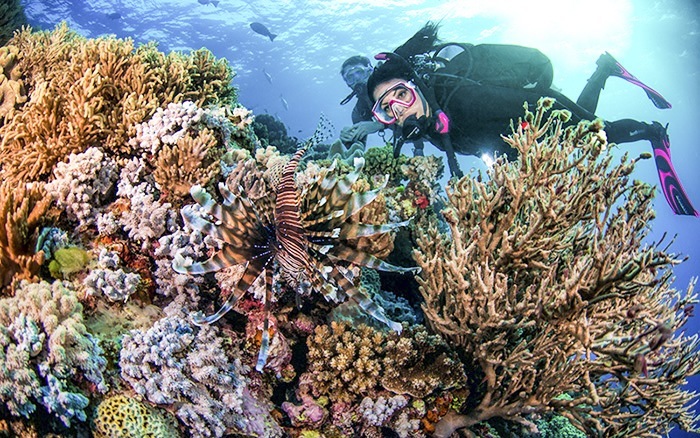
Why is everybody getting their knickers in knots over coral reefs being bleached?
That only makes them cleaner, yes?
What's so great about the Great Barrier Reef? It's only a tourist trap isn't it!
Can you see it from space?
Reefs are no more than a few pretty fish and coloured limestone, aren't they?
Coral's hard not soft, yes?
Climate change and pollution have no effect on coral reefs have they?
So what if we lose a few reefs?
Any of the above sound familiar? Well now that I've got your attention, let's straighten out some common misconceptions (untie some reef knots) and set the record straight about why we should be concerned about the health of our worldwide coral reefs.
Much of the information below comes from the Great Barrier Reef Marine Park Authority (GBRMPA) which is the Australian federal government's manager of the Great Barrier Reef, charged with the fundamental obligation of protecting this World Heritage-listed natural wonder, along with extracts from the Queensland Museum publications and a few other on line databases. I have held an interest in the Great Barrier Reef since my early childhood in Scotland, and this was rekindled when I moved, some 30 years ago, to the east coast of the 'Lucky Country', off which the GBR lies. It follows then that this blog, mostly through convenience and local familiarity, concentrates on observations and behaviour documented on the GBR, but it is possible that much of the data which I have re-presented and summarised may also be common to some of the many other worldwide reef systems, such as the following:
- The reefs of the Coral Triangle, located in the shallow coastal waters around Indonesia, Malaysia, PNG, the Philippines, Solomon Islands and East Timor;
- The Mesoamerican Barrier Reef System;
- The New Caledonia Barrier Reef;
- The Andros, Bahamas Barrier Reef;
- The Red Sea Fringing Reefs;
- The Florida Reef Tract; and
- The Bermuda Reef system.
So What's the Goss with the GBR?
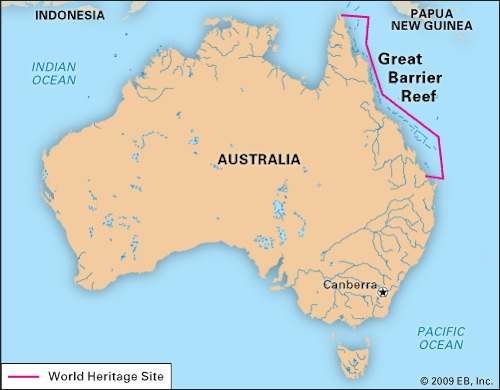
- covers 344,400 square kilometres in area - that's bigger than the UK, Switzerland and Holland combined; or about the same area as Japan, Germany, Malaysia or Italy; or half the size of Texas (nothing, of course, is bigger than Texas);
- stretches approximately 2300 km along the Queensland coast (that's in north-east Australia for the geographically challenged and those of you who aren't fortunate enough to live where it's "beautiful one day, perfect the next") - that approximates to the length of the US west coast, from Vancouver south to Trump's Wall;
- includes the world's largest coral reef ecosystem;
- includes some 300 coral reefs, 600 continental islands, 300 coral cays and about 150 inshore mangrove islands;
- is between 60 and 250 km in width; and
- has an average depth of 35 m in its inshore waters, while on outer reefs, continental slopes extend down to depths of more than 200 m.
So What's this Coral Stuff?
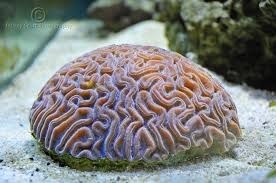
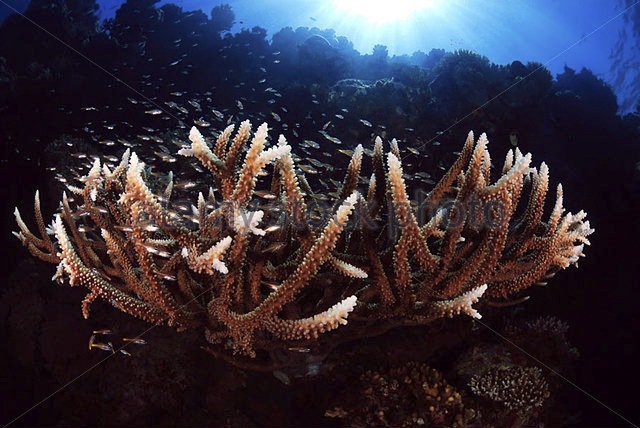
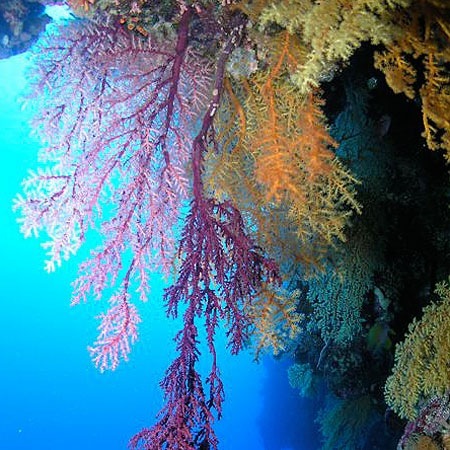
So Does my Visit Get me Anything other than Fish and (Coral) Chips?
- Marine mammals (whales, dolphins, dugong, seals) - There are over 30 species of marine mammals, of which the dugong (or seacow) is one of the strangest looking, feeding on sea grasses, which she scoops up quicker than your mother-in-law's vacuum cleaner.
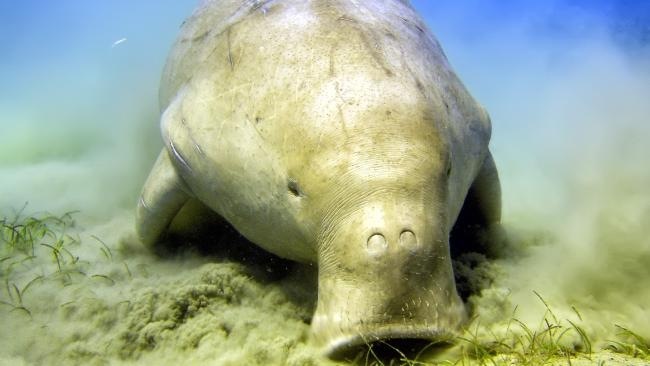
- Birds, sea birds and shorebirds - The GBR and its islands and cays support 22 seabird species (all with immaculate oral hygiene, since, "birds of a feather, floss together").
- Marine turtles - Six of the world's seven species of marine turtles occur on the GBR (best way to talk with them is by 'shell phone', and the best way to get their pic is via a 'shell-fie').
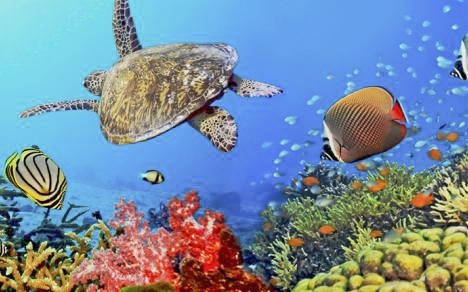
- Crocodiles - Salt water crocs can be found near many of the GBR islands and cays (even without a GPS they're great 'navi-gators').
- Sea snakes - Home to 14 different species (incidentally they all work for the government and are therefore 'civil serpents').
- Sharks and rays - 133 species ranging from small epaulette sharks to large whale sharks (plus the local casinos have quite a few 'cardsharks').
- Fishes - An estimated 1625 species of bony fish (it is said that the sturgeon can operate on the brain coral).
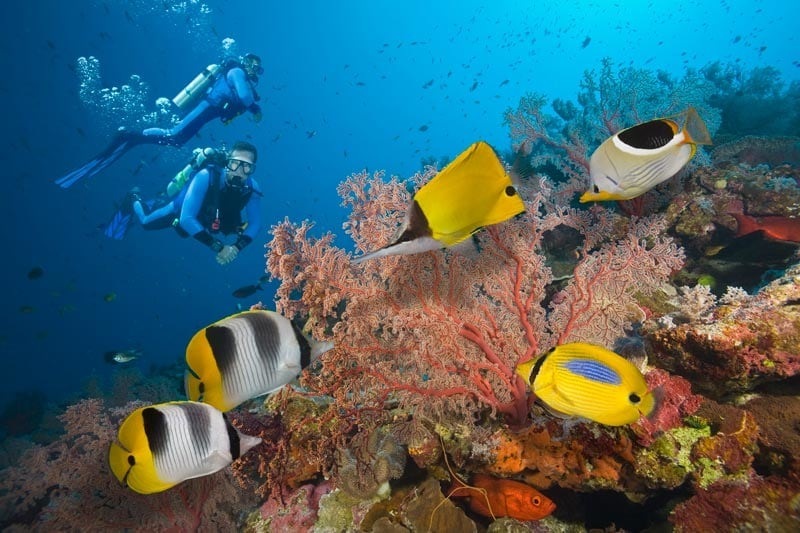
- Echinoderms - Starfish may be the most well known of the 630 species (incidentally never ask for directions from a starfish).
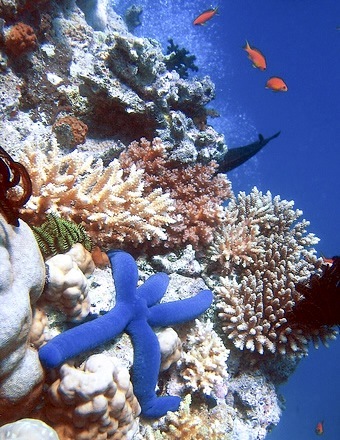
- Crustaceans - 1300 species, including some commercially important ones such as crabs and prawns (these spend a solitary existence as they tend to be very 'shellfish').
- Molluscs - Over 200 species including clams, oysters, squid, octopus, cuttlefish, nautilus, nudibranchs, chitons and snails (of course you won't find the latter at McDonald's, which only serves fast food).
- Hard corals - The building blocks of the reef with over 450 species known (I wonder if the reef creatures sing Christmas Corals over the festivities?).
- Sea anemones - Around 40 species (the clown fish below must be thinking, "with fronds like these, who needs anemones?").
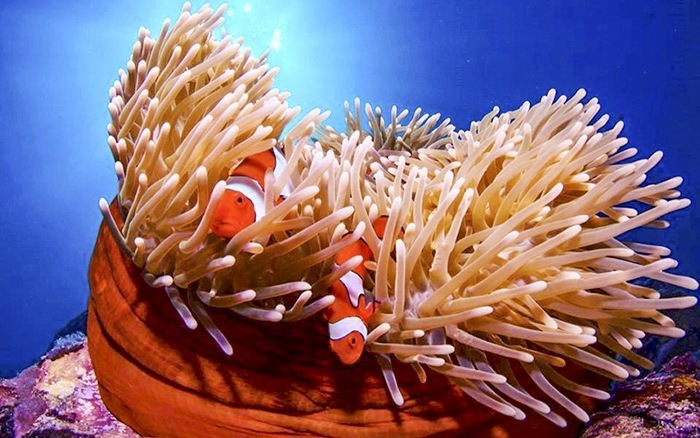
- Soft corals - With over 150 species, these swaying creatures with jelly-like fleshy tissue are often mistaken for plants (they live a harmonious existence as they always 'coral-ate' with each other).
- Jellyfish - Locally known as 'stingers' there are over 100 species (I know you'll think that I'm talking crap when I tell you that their mouth is also their anus).
- Sponges - Colourful and common reef animals (no doubt studied by so many scientists because they're so absorbing?).
So Just What is Coral Bleaching?
- increase in water temperature;
- oxygen starvation from increased plankton as a result of over fishing;
- increased sedimentation from silt runoff into the rivers system flowing towards the reef;
- changes in water salinity and pH;
- herbicides introduced as runoff from adjacent cane farming or other intensive agricultural practices;
- elevated sea levels from global warming; and
- ocean acidification from elevated carbon dioxide levels caused by air pollution.
Marine scientists and reef managers have a wide consensus of opinion that, unless climate change can be controlled (primarily by stopping the burning of coal for energy and the reduction of greenhouse gas emissions globally) along with other human induced polluting and adverse activities, 90% of reefs, worldwide, are likely to be at risk of major and probably irreversible bleaching events by 2030, with all reefs at risk by 2050.
So What's the Biggie if We Lose a Few Reefs?
- Loss of fish for food;
- Loss of shelter and protection from predators for smaller sea life;
- Loss of livelihood for fishing communities;
- Loss of ecotourism; and
- Loss of protective barriers for coastlines, resulting in increased wave impact and damage from storms, erosion and flooding.
They took all the [reefs],
Put 'em in a [reef] museum,
And they charged the people,
A dollar and a half just to see 'em.
Don't it always seem to go.....................<<..................>>...................
That you don't know what you've got
Till it's gone .....
- Pro Dive, Cairns
- Deep Sea Divers, Cairns
- Queensland Museum
- Various on line stock photos.

http://ken-boddie.squarespace.com
The author of the above, Ken Boddie, besides being a sometime poet and occasional writer, is an enthusiastic photographer, rarely leisure-travelling without his Canon, and loves to interact with other like-minded people with diverse interests.
Ken's three day work week (part time commitment) as a consulting engineer allows him to follow his photography interests, and to plan trips to an ever increasing list of countries and places of scenic beauty and cultural diversity.
in Engineering our Future and in 1 more group
Articles from Ken Boddie
View blog
Kia ora, nau mai ki Aotearoa (Hello and welcome to the Land of the Long White Cloud). · It had been ...

The Japanese are seemingly working on a ‘ground-breaking’ solution to prevent earthquake damage to d ...
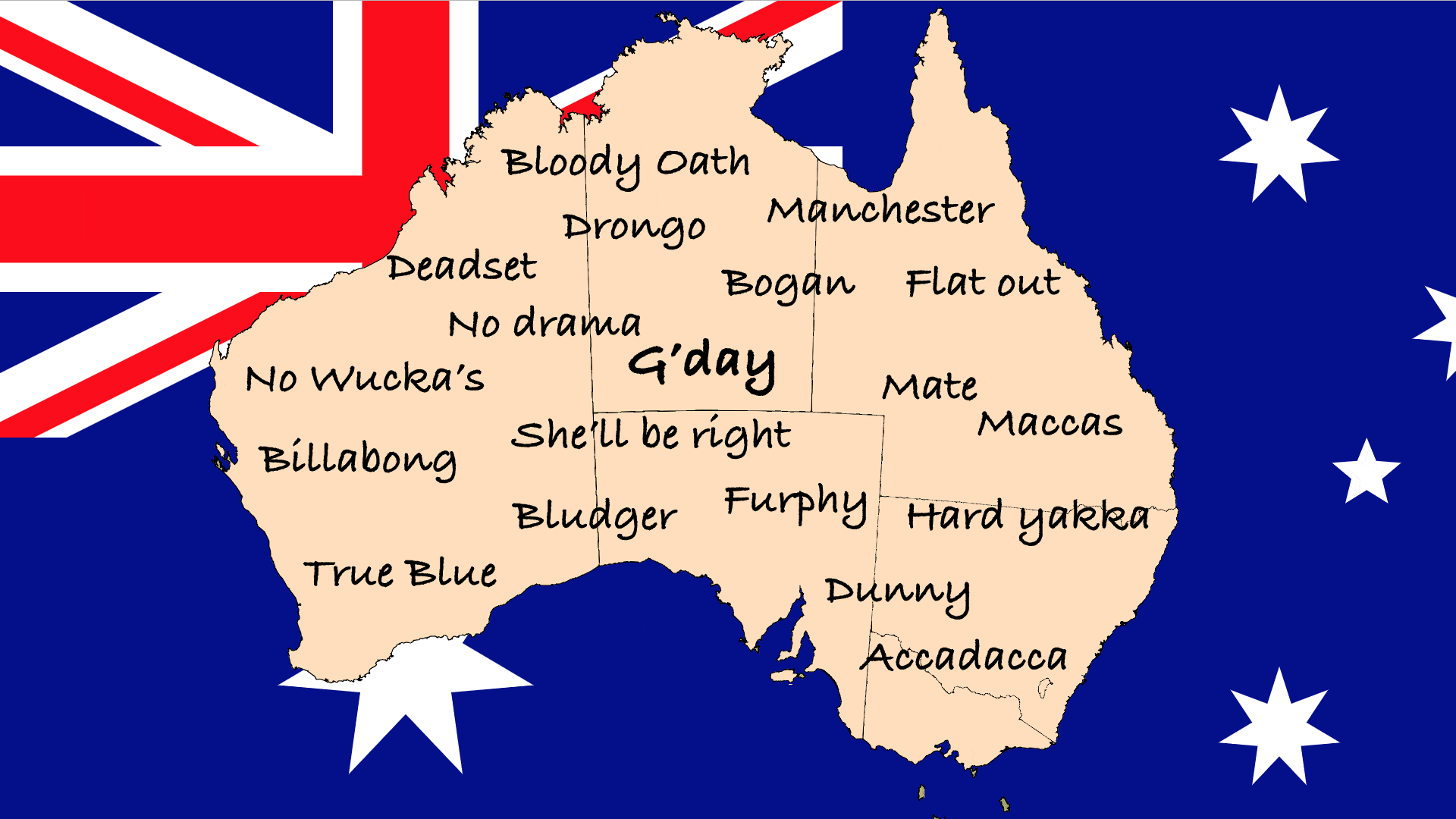
I've been busier than a mozzie (mosquito) at a nudist beach lately, so I haven't made time to write ...
Related professionals
You may be interested in these jobs
-
Psychology & Counselling -
Found in: Talent AU C2 - 4 days ago
You Matter Allied Health Victoria, Australia Full timeWe are seeking a highly skilled and dedicated Provisional Psychologist to join our team in the Health, Wellness, and Fitness industry. As a Provisional Psychologist, you will play a vital role in providing therapeutic services to individuals in order to promote mental health and ...
-
Civil Senior Supervisor
Found in: Talent AU C2 - 4 days ago
Warrikal Western Australia Full timeGrowing team lead by a supportive management structure · Competitive remuneration · Permanent position | FIFO roles on 14/7 roster · ABOUT US · Warrikal is a Western Australian owned and operated, multidisciplined engineering company across the mining, marine and resource sectors ...
-
Level One IT Support
Found in: Talent AU C2 - 1 week ago
Michael Page Perth, Australia TemporaryAbout Our Client · A local organisation that typically oversees a specific geographic area within a city or region, managing public services. They work on improving community services and residents' quality of life. Additionally, our client foster a sense of contribution to the c ...



Comments
Ken Boddie
2 years ago #36
Quite right, Lada, and while our politicians continue to share the bed with the petroleum, gas and coal mining sectors, we are likely to lose the majority of our reefs, as we know them, well before 2050. This does’t stop our scientists, however, from giving it a go, on pitifully small budgets. If you and your mollusc-keen husband ever had any slight incling to come and see the GBR for yourselves, and if this COVID thing ever permits unrestricted travel again, then I would plan to visit sooner than later. 🐠
Time is running out to stabilise and reverse the processes we are seeing, and even the initiatives and applications of so many scientists, to artificially propogate and accelerate the natural recovery processes, will soon be fruitless.
Lada 🏡 Prkic
2 years ago #35
Ken, this issue is more alarming than three years ago. I regularly read the National Geographic articles, and I'd like to quote this:
“We know that because there have been six major coral reef extinctions in the geologic past where they were basically wiped out. All those have been associated with excessive heat and ocean acidification. Coral reefs always come back, but it takes tens of thousands of years. Now, with climate change-driven temperatures rising at a rate higher than corals have ever had to naturally adapt to. We don’t have that kind of time.”
Ken Boddie
2 years ago #34
Since I first published this post back in 2018, reefs around the world continue to suffer from coral bleaching, and the worst contributor to the problem continues to be man-made climate change with the associated rise in seawater temperatures. There is still hope, however, and there are quite a few scientists here is Oz working on various longterm solutions and strategies including:
You can find out more at this link:
https://www.barrierreef.org/news/blog/what-we-re-doing-to-save-our-reef-and-how-you-can-help
Ken Boddie
6 years ago #33
Ken Boddie
6 years ago #32
I fear things have got way beyond how much power we use, Claire. It’s the source of the power that’s important Also, I suggest that you look at my bullet point list of triggers.
Ken Boddie
6 years ago #31
Ken Boddie
6 years ago #30
Mother warned me, True’s the tale, Should I meet a stranger, Never give out my email, Lest it lead to danger. 🤣😂🤣
Lisa Vanderburg
6 years ago #29
No need...quite capable of losing my own arguments with all manner of kitchenware :)
Ken Boddie
6 years ago #28
You seem to be one tough lady, Lisa Vanderburg Remind me never to argue with you. 😳
Lisa Vanderburg
6 years ago #27
lol....I actually yanked on the tendon awhile (until my finger jumping up & down twigged my brain...duh) thinking; I don't remember cooking linguine...?? 'No time for such nonsense...must get home [to look after my hubby]' I said in the ER when he said I'd have to stay overnight. Had it stitched 3 days later and cut the cast off the same day. Needs must as the drizzle dries :)
Ken Boddie
6 years ago #26
I’m guessing you didn’t find it funny, Lisa, and so weren’t ‘in stitches’? 😷 💉
Ken Boddie
6 years ago #25
Lisa Vanderburg
6 years ago #24
well...sometimes I am; just depends on which side of the pond bed I got up from, US or UK :) Anyhoo, I'll never get my pinkie up again - cut the tendons on a bleedin' PYREX dish - didn't feel a thing! Who knew?
Ken Boddie
6 years ago #23
Ken Boddie
6 years ago #22
Too true, Ms Fraser! So have you got a few spare billion to chip in and get the clean-up started? 💵
Lisa Vanderburg
6 years ago #21
Lisa Gallagher
6 years ago #20
Lada 🏡 Prkic
6 years ago #19
Yes ignorance but also greed.
Ken Boddie
6 years ago #18
Perhaps a bit of humour helps sell the message, Lada, but the ignorance of some of our politicians and industrial magnates is far from laughable.
Ken Boddie
6 years ago #17
GBRMPA is certainly doing a proactive job, , but their hands are tied by mining greed here in Oz and the effects of worldwide emissions and climate change.
Ken Boddie
6 years ago #16
Sounds idillic, Pak Paul, although we're trying to sell up and move soon. Life's getting hectic. Put me down as a definite maybe.
Ken Boddie
6 years ago #15
Thanks, Ian. I must admit I did think of mentionong you when I penned the “sturgeon operates on the brain coral” but didn't want to risk upsetting either you or the sturgeon. 🤣😂🤣
🐝 Fatima G. Williams
6 years ago #14
Lada 🏡 Prkic
6 years ago #13
Paul Walters
6 years ago #12
Ian Weinberg
6 years ago #11
Louise Smith
6 years ago #10
I am sure I would be Ken !
Ken Boddie
6 years ago #9
lets hope, Gert, we’ll still have a ‘Great’ Barrier Reef on your next visit.
Ken Boddie
6 years ago #8
You might be shocked, Louise, at just how much of the reef is currently bleached.
Ken Boddie
6 years ago #7
many thanks, Randy. 👍
Gert Scholtz
6 years ago #6
Louise Smith
6 years ago #5
Randall Burns
6 years ago #4
Ken Boddie
6 years ago #3
And a unique treasure, Pascal, that may be slowly slip sliding away.
Ken Boddie
6 years ago #2
Pascal Derrien
6 years ago #1